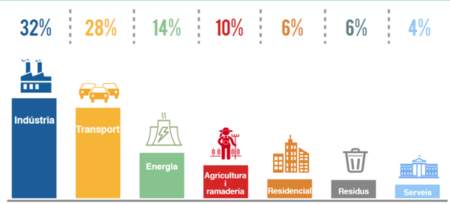This month, The Climate Group hosted a webinar as part of our Annual Disclosure Technical Support Webinar Series, which aims to explore key topics to empower states and regions with the tools necessary to complete the Annual Disclosure questionnaire, supporting them to report and strengthen their climate action.
This webinar, which was held in Spanish, focused on Catalonia’s climate targets, including the progress made towards reaching them and the government’s ongoing commitment to transparency.
How long has Catalonia been disclosing its emissions and climate action?
Catalonia has been at the forefront of transparent climate action for many years. Since 2015, the region has been voluntarily disclosing its emissions and ambitious climate targets on an annual basis as part of the Climate Group and CDP’s Annual Disclosure initiative with states and regions. It is one of the 28 regions that have disclosed their data every year.
Annual Disclosure provides a transparent, global picture of the impact, progress and climate action driven by state and regional governments around the world. The process also supports governments to better understand the risks and opportunities presented by their emissions, so they can improve their emissions reduction strategies.
What are the current climate targets that Catalonia is working towards?
Catalonia’s Climate Change Act targets 100% carbon neutrality by 2050 in line with the targets set by the EU Commission – one of ten Under2 Coalition states and regions to make this commitment.
Whilst the targets set by the EU commission primarily extended to national actors, we felt that the actions of Catalonia, alongside other states and regions, were crucial in making the goal attainable.
Initially (2008-2012), we were using the same climate targets as the national government. Then, for our 2020 and 2030 targets, we made the decision to apply the same criterion that the EU uses to divide the efforts between their members states: GDP per capita as a measure to determine Catalonia’s contribution as a region to GHG emissions.
However, we felt that this measure was insufficient and we wanted to do more: a net-zero emissions economy by 2050.
Whilst the targets set by the EU commission primarily extended to national actors, we felt that the actions of Catalonia, alongside other states and regions, were crucial in making the goal attainable.
Initially (2008-2012), we were using the same climate targets as the national government. Then, for our 2020 and 2030 targets, we made the decision to apply the same criterion that the EU uses to divide the efforts between their members states: GDP per capita as a measure to determine Catalonia’s contribution as a region to GHG emissions.
However, we felt that this measure was insufficient and we wanted to do more: a net-zero emissions economy by 2050.
In May 2019, Catalonia joined hundreds of other political institutions in declaring a climate emergency. As part of this strategy, the government has aired its commitment to adopting the necessary measures to reach the goals set for mitigating climate change and attaining energy transition.
What progress has been made recently towards meeting these targets?
Over the last 12-months, Catalonia has implemented a number of strategies to work towards their target, including determining the emissions reductions that are required per sector and establishing a committee of experts on climate change.
We are bringing together a variety of stakeholders within our recently formed Committee of Experts on Climate Change across different sectors to ensure that we remain on track to meet our long-term goals and are continuing to transparently disclosure our progress annually.
The Committee is attached to the Ministry of Territory and Sustainability and made up of seven members appointed by Parliament. They are responsible for presenting proposed carbon budgets to the Catalan government and for monitoring and evaluating them.
We are bringing together a variety of stakeholders within our recently formed Committee of Experts on Climate Change across different sectors to ensure that we remain on track to meet our long-term goals and are continuing to transparently disclosure our progress annually.
The Committee is attached to the Ministry of Territory and Sustainability and made up of seven members appointed by Parliament. They are responsible for presenting proposed carbon budgets to the Catalan government and for monitoring and evaluating them.

As reported in 2016, industrial emissions were the greatest contributor to Catalonia’s total GHG emissions (32%).
By breaking emissions down into sectors and disclosing these figures, we were in a better place to implement specific, targeted strategies and be held more accountable for progress towards meeting them.
Having passed the Climate Change Act in 2017, taxes on the industrial sector are currently being developed, with new laws going to force earlier this year.
By breaking emissions down into sectors and disclosing these figures, we were in a better place to implement specific, targeted strategies and be held more accountable for progress towards meeting them.
Having passed the Climate Change Act in 2017, taxes on the industrial sector are currently being developed, with new laws going to force earlier this year.
The new taxes on the industrial sector start at an average of €10/ton of CO2 in 2019 and gradually rising to about €30/ton in 2025.
What's next?
This years’ Annual Disclosure report will be published ahead of COP25 in December, so watch this space for a summary of state and regional climate action including an update from Catalonia.